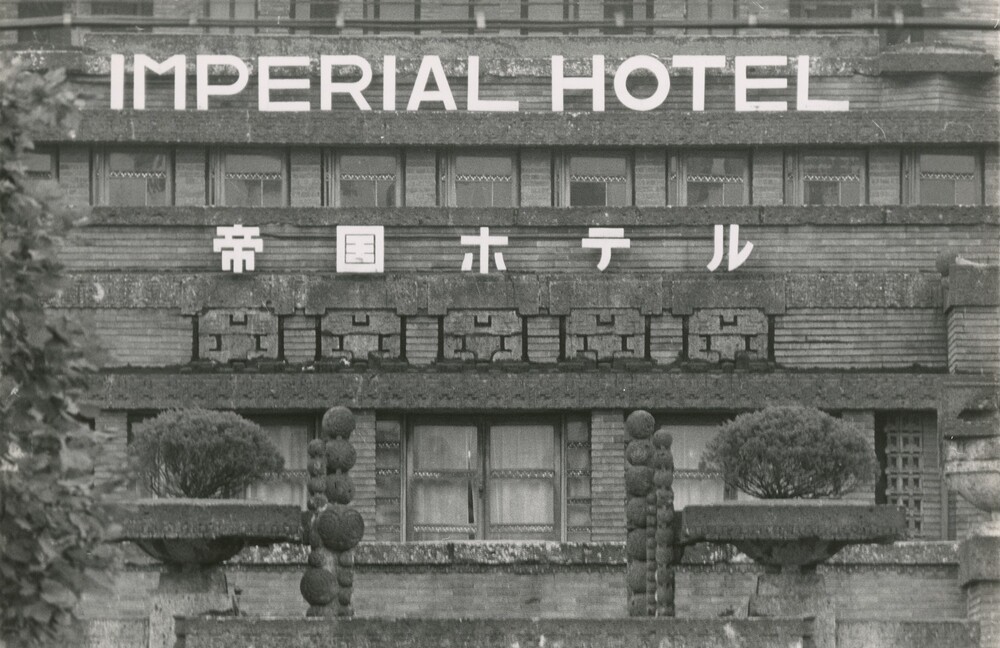Discover the Charm of the Imperial Hotel! From History to Accommodation and Souvenirs
What comes to mind when you hear the name “Imperial Hotel”?
Prestige? Tradition? Or perhaps it seems a bit exclusive?
Whatever the image, the Imperial Hotel stands as one of Japan’s most distinguished luxury hotels, boasting a history of over 130 years.
Originally established as a state guesthouse to welcome international dignitaries, the Imperial Hotel has played a key role in Japan’s modernization.
Even today, it continues to uphold its tradition and prestige while delivering the finest hospitality to guests from around the world.
In this article, we’ll delve into the Imperial Hotel’s history, highlights, facilities, services, accommodation rates, and dining options—all the essential information you need to know.
Whether you’re curious about the Imperial Hotel, planning a stay, or considering a visit to its renowned restaurants, this guide is for you.
Imperial Hotel: Essential Facts to Know
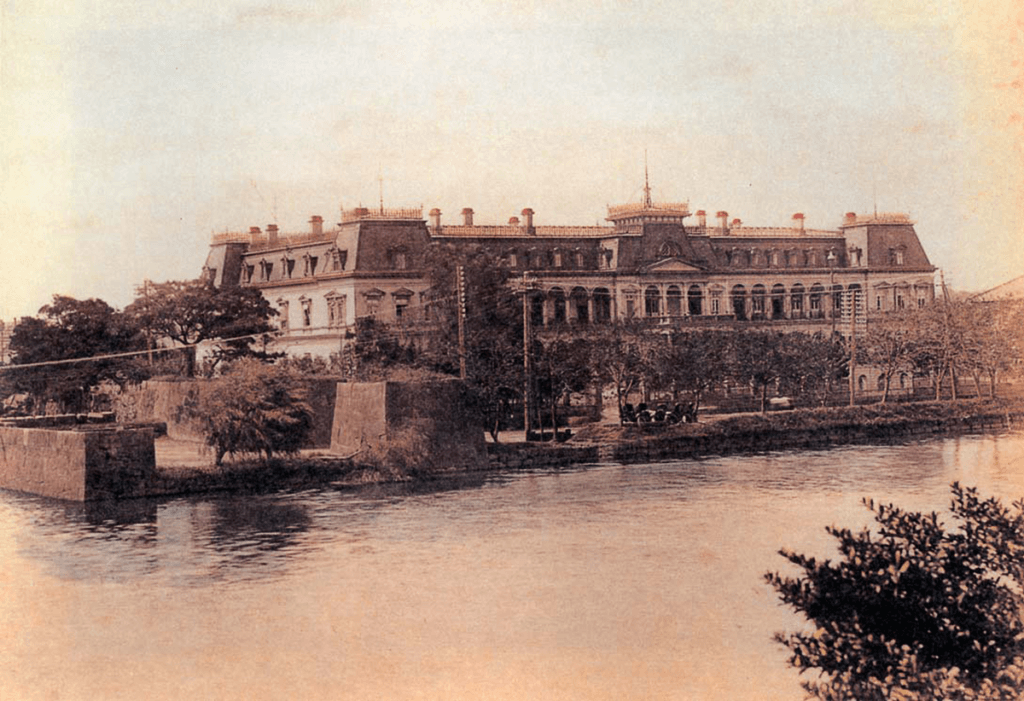
The History and Journey of the Imperial Hotel
The Imperial Hotel is one of Japan’s most prestigious luxury hotels, boasting a history that spans over 130 years, tracing back to the Meiji era.
In 1890, as Japan sought to establish itself as a modern nation, the Imperial Hotel was constructed in Tokyo’s Hibiya district to serve as a state guesthouse for hosting foreign dignitaries.
The hotel, brought to life through the efforts of influential political and business figures, was designed by Yuzuru Watanabe, who had studied architecture in Germany.
Its revolutionary structure, a three-story building made of timber and brick, embodied cutting-edge technology of the time and garnered high praise from international guests.
Since its opening, the hotel has served as “Japan’s guesthouse,” welcoming numerous distinguished figures and becoming a symbol of Japan’s modernization.
In 1923, the second-generation main building, designed by the renowned architect Frank Lloyd Wright, was completed. Known as the “Wright Building,” it amazed many with its resilient structure, surviving the Great Kanto Earthquake.
The Wright Building also gained global acclaim for its innovative features, including being the first hotel in the world to install central steam heating throughout.
During the earthquake, the hotel provided shelter to local residents, cementing its role as a vital social institution.
After World War II, the Imperial Hotel continued to evolve alongside Japan’s growth.
On March 10, 1970, the current main building was inaugurated. In 1996, the Imperial Hotel Osaka opened, combining urban sophistication with warm hospitality, earning acclaim as a premier hotel.
Meanwhile, in Nagano Prefecture’s Kamikochi, the Kamikochi Imperial Hotel, opened in 1933, has become a beloved resort destination where guests can enjoy the breathtaking natural beauty of the changing seasons.
In 2019, the Imperial Hotel Tokyo celebrated its 130th anniversary, solidifying its reputation as a hotel that harmoniously balances tradition and innovation, winning support from guests both in Japan and abroad.
Today, the Imperial Hotel operates three locations: Tokyo, Osaka, and Kamikochi. Each facility offers exceptional hospitality and refined spaces, earning the admiration of guests worldwide.
For instance, at the Kamikochi Imperial Hotel, visitors can experience the stunning natural beauty of the surrounding landscapes throughout the year, creating unforgettable memories.
Moving forward, the Imperial Hotel remains committed to preserving its traditions while embracing innovation, ensuring that every guest enjoys an unparalleled experience.
Imperial Hotel Timeline and Significant Events
| Year | Event | Description |
|---|---|---|
| 1890 | Opening of the First Imperial Hotel | Opened in Hibiya, Tokyo, as a symbol of Japan’s modernization. Designed by Josiah Conder. |
| 1923 | Completion of the Wright-designed Main Building (Wright Building) | Designed by Frank Lloyd Wright, it featured earthquake-resistant construction and artistic design. The building was closed in 1968. |
| 1933 | Opening of Kamikochi Imperial Hotel | A mountain resort hotel surrounded by the beautiful nature of the Japanese Alps, still operational seasonally today. |
| 1954 | Completion of the First New Wing | An extension of the Wright Building, incorporating modern facilities and design. |
| 1958 | Completion of the Second New Wing | Added to accommodate increasing demand, featuring significantly more guest rooms. |
| 1961 | Listed on the Tokyo Stock Exchange Second Section | Imperial Hotel became a public company, marking a new era in its development. |
| 1968 | Closure and Demolition of the Wright Building | Due to aging and outdated facilities, the Wright Building was demolished for new construction. |
| 1970 | Opening of the New Main Building | A modern steel-reinforced concrete structure opened to coincide with the Osaka Expo. |
| 1977 | Death of Hironobu Kanai (“King of North China Tobacco”) and Transfer of Shares | Ownership of the hotel shifted to Kokusai Kogyo under Kenji Osano. |
| 1983 | Completion of the Imperial Tower | A 31-story skyscraper with hotel floors on the upper levels, catering to business needs. |
| 1990 | 100th Anniversary of the Imperial Hotel | Celebrations highlighted its legacy as a premier luxury hotel in Japan. |
| 1992 | Opening of The Crest Hotel Tsudanuma | A community-focused hotel in Chiba Prefecture. |
| 1993 | Opening of Bali Imperial Hotel | A resort in Bali, marking the hotel’s international expansion. |
| 1994 | Renovation of Kamikochi Imperial Hotel | Enhanced the comfort and appeal of the resort property. |
| 1996 | Opening of Imperial Hotel Osaka; Renaming of Tokyo Property | Expanded the brand with a new urban property in Osaka. |
| 1998 | Partnership with National Town and Village Assembly Hall | Provided expertise in food and lodging services. |
| 1999 | Opening of Hotel Grand Arc Hanzomon | A new property in Tokyo catering to diverse needs. |
| 2000 | Opening of The Crest Hotel Kashiwa | Another expansion in Chiba Prefecture. |
| 2002 | Closure of The Crest Hotel Tsudanuma | Hotel operations ceased due to changing demand. |
| 2003 | End of Bali Imperial Hotel Management Contract | The resort management contract in Bali was concluded. |
| 2004 | Kokusai Kogyo Acquired by Cerberus Capital | A major shareholder restructuring affected the hotel’s ownership. |
| 2007 | Majority of Imperial Hotel Shares Sold to Mitsui Fudosan | Mitsui Fudosan became the largest shareholder, significantly impacting hotel management. |
| 2014 | Withdrawal from Train Dining Car Operations | Ended long-standing involvement in providing dining services on trains. |
| 2015 | Closure of The Crest Hotel Tachikawa | Closed in response to evolving market demands. |
| 2016 | Renovation of Imperial Tower | Modernized the lower floors of the tower to enhance guest experiences. |
| 2019 | Opening of Halekulani Okinawa; 130th Anniversary of Imperial Hotel Tokyo | Celebrated the brand’s legacy and expanded with a new Okinawan resort. |
| 2021 | Redevelopment Plan for Uchisaiwaicho District | Announced plans to rebuild the Tokyo property and contribute to urban redevelopment. |
| 2024 | Scheduled Closure of Imperial Tower for Reconstruction | The current tower will close, initiating its replacement. |
| 2026 | Planned Opening of Kyoto Imperial Hotel | A new property is scheduled to open in the historic Gion district of Kyoto. |
| 2030 | Scheduled Completion of the New Tower | The new Imperial Tower is expected to be completed. |
| 2036 | Scheduled Completion of the New Main Building | The Tokyo main building is planned to be completed. |
Overview of Imperial Hotel Facilities
The Imperial Hotel operates unique facilities in Tokyo, Osaka, and Kamikochi, each offering distinct features and experiences. Here is an overview of each hotel’s facilities:
Imperial Hotel Tokyo
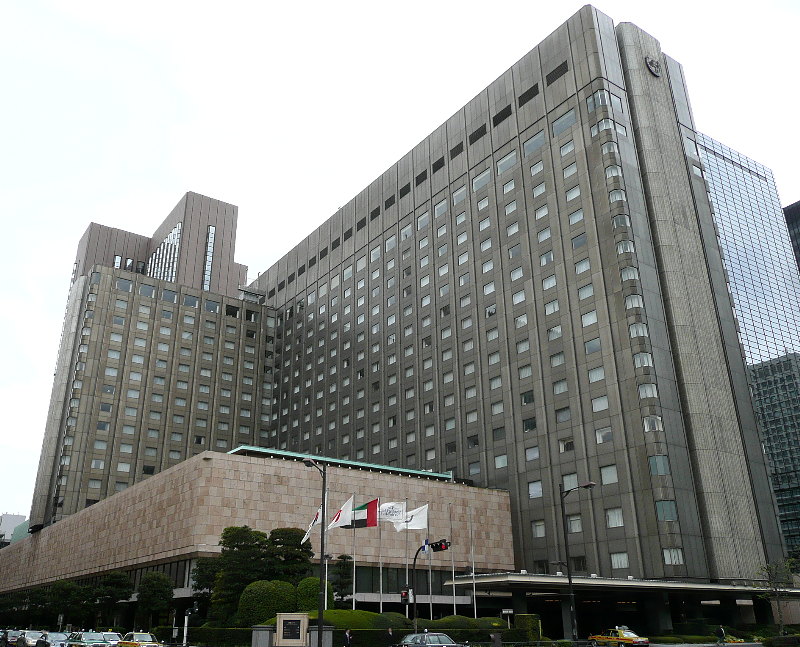
Located in the heart of Tokyo, the Imperial Hotel Tokyo consists of the Main Building and the Tower, serving as an ideal base for business and leisure.
- Guest Rooms:
- Main Building: 772 rooms
- Tower: 361 rooms
- Dining:
Offers a variety of dining options, including French, Japanese, and Chinese cuisines, as well as buffet restaurants and all-day dining. - Bars:
Includes the iconic “Old Imperial Bar,” providing a sophisticated setting for relaxation. - Other Facilities:
Features banquet halls, conference rooms, a fitness center, swimming pool, sauna, business center, and a shopping arcade.
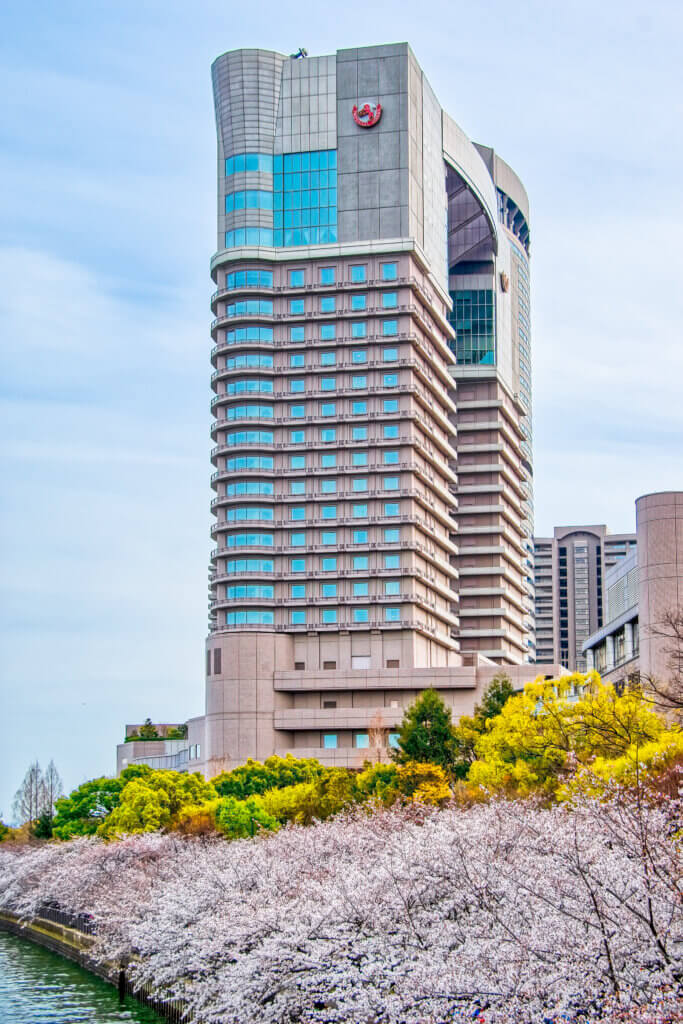
Imperial Hotel Osaka
Situated in Osaka’s business and cultural hub, the Imperial Hotel Osaka combines urban sophistication with warm hospitality.
- Guest Rooms: 387 rooms
- Dining:
Includes French and Chinese restaurants, casual dining options, and a buffet lounge. - Bars:
Enjoy the serene ambiance of the “Old Imperial Bar” while sipping on premium drinks. - Other Facilities:
Includes banquet halls, conference rooms, a fitness club, a business center, and a shopping arcade.
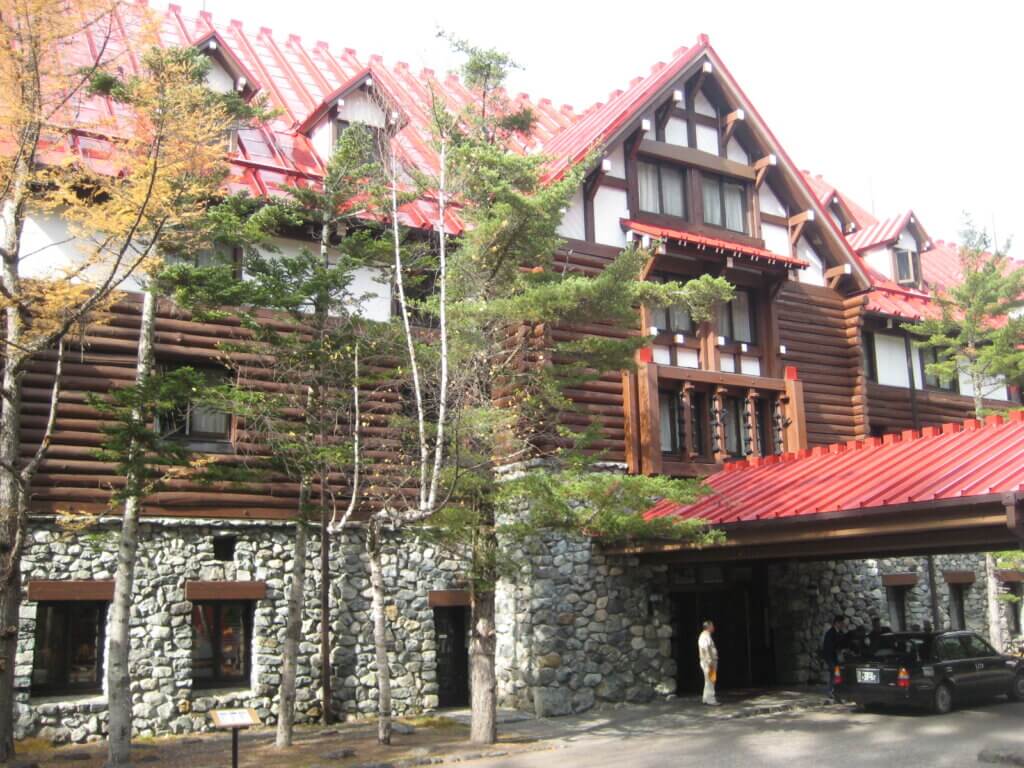
Kamikochi Imperial Hotel
Nestled in the scenic Kamikochi area of the Northern Japanese Alps, this resort hotel offers a tranquil escape amidst breathtaking natural beauty.
- Guest Rooms: 75 rooms
- Dining:
Features a dining room, Japanese restaurant, and lounge where guests can savor meals while enjoying the surrounding scenery. - Other Facilities:
Includes a lobby lounge, bar, and gift shop, ensuring a comfortable and relaxing stay.
Easy Guide to Accessing the Imperial Hotel Tokyo: Nearest Stations and Routes
The Imperial Hotel Tokyo is conveniently located in Uchisaiwaicho, Chiyoda City, Tokyo. Here’s how to reach the hotel from the nearest stations and by other means of transportation:
From the Nearest Stations
- Tokyo Metro Hibiya Station
- Access Time: About 3 minutes on foot
- Directions:
- Exit from A13 at Hibiya Station.
- Turn right after exiting, then take the first left.
- Walk straight, and you’ll see the Imperial Hotel ahead.
- Tip: This is the closest station, ideal for rainy days or when carrying heavy luggage.
- JR Yurakucho Station
- Access Time: About 5 minutes on foot
- Directions:
- Exit from the Hibiya Exit of Yurakucho Station.
- Walk along Harumi Street to the left.
- Look for the Imperial Hotel sign as a guide, and you’ll reach the hotel.
- Tip: Convenient for travelers arriving via Tokyo Station or Haneda Airport using JR lines.
- Tokyo Metro Ginza Station
- Access Time: About 5 minutes on foot
- Directions:
- Exit from C1 at Ginza Station.
- Walk right along Harumi Street.
- Pass Hibiya Park, and the Imperial Hotel will appear.
- Tip: A great option if you want to explore the Ginza area before heading to the hotel.
By Bus
For those using public buses, the “Imperial Hotel-mae” bus stop is the most convenient. From there, it’s just a few minutes’ walk to the hotel, providing a comfortable alternative to trains.
By Car
- Highways:
- About 5 minutes from the Ginza Exit or Kasumigaseki Exit on the Shuto Expressway Loop Line.
- Hotel Parking:
- Dedicated parking is available at the hotel.
- Note: There are vehicle size restrictions, so it’s best to confirm with the hotel in advance.
By Taxi
Simply tell the driver “Imperial Hotel,” and they’ll navigate you there with ease. Taxis are especially convenient for those with large luggage or on rainy days, providing a stress-free travel option.
With multiple access routes and transportation options, reaching the Imperial Hotel is both straightforward and convenient. Choose the one that best suits your travel needs!
Make the Most of the Imperial Hotel: Gourmet, Accommodation, and Souvenirs
Imperial Hotel Restaurant Information
The Imperial Hotel offers a wide variety of restaurants, including Japanese, Western, and Chinese cuisine. Whether for special celebrations, business meetings, or family gatherings, these restaurants cater to various needs.
Imperial Hotel Tokyo
- Les Saisons
A restaurant offering innovative French cuisine with a modern twist on traditional flavors. - La Brasserie
A casual brasserie where you can enjoy authentic French dishes in a relaxed atmosphere. - Gargantua
A Japanese restaurant known for its exquisite flavors and dishes crafted from seasonal ingredients. - Pekin
A Chinese restaurant blending traditional techniques with innovative approaches to create unique dishes. - Imperial Viking Sal
A buffet-style restaurant offering a variety of dishes from Japanese, Western, and Chinese cuisines. - Parkside Diner
A bright, open dining space featuring a diverse menu for casual all-day dining. - Old Imperial Bar
A classic bar with a sophisticated ambiance, serving fine cocktails and whiskeys.
Imperial Hotel Osaka
- Les Saisons
Refined French cuisine that merges tradition with innovation. - Jasmine Garden
Authentic Cantonese cuisine featuring seasonal ingredients. - Café Couvert
A buffet-style restaurant in a bright and open space, offering a wide range of dishes. - The Bar
A tranquil spot for enjoying premium cocktails and whiskeys.
Kamikochi Imperial Hotel
- Dining Room
A restaurant with large windows offering breathtaking views of nature, serving dishes made with seasonal ingredients. - Lounge
A relaxing space for light meals, coffee, or bar service.
Imperial Hotel Lunch Buffet Menu
At Imperial Viking Sal in Tokyo, guests can enjoy a wide range of Japanese, Western, and Chinese dishes in a buffet style. The menu features vibrant dishes crafted with seasonal ingredients.
- Cold Dishes: Fresh vegetable salads, colorful appetizers, and marinated seafood.
- Hot Dishes: Meat, fish, pasta, curry, and soups, with a rotating daily selection.
- Desserts: A variety of cakes, tarts, ice creams, and fruits crafted by skilled pastry chefs.
The menu changes based on the season and day, ensuring a fresh experience with every visit.
Imperial Viking Sal at the Imperial Hotel Tokyo is renowned as the first restaurant in Japan to introduce the buffet-style dining concept. It offers a wide variety of Japanese, Western, and Chinese dishes in an elegant buffet format.
Lunch Buffet Pricing
- Weekdays: Adults ¥12,000 / Children (4–12 years old) ¥6,500
- Weekends and Holidays: Adults ¥14,000 / Children (4–12 years old) ¥8,000
Service charge and tax are included in the prices above.
Operating Hours
- Lunch: 11:00 AM – 3:00 PM
- Dinner: 5:30 PM – 10:00 PM
Highlights of the Menu
Following its renovation on August 1, 2023, the menu now includes French cuisine alongside Japanese and Chinese dishes. The variety of offerings has expanded from approximately 40 items to 50 items, featuring seasonal ingredients.
Reservations
Reservations can be made online or by phone. For details, please check the official website.
Important Notes
Menu items and pricing are subject to change. Please refer to the official website for the most up-to-date information.
Enjoy the diverse and seasonal dishes at Imperial Viking Sal and experience a culinary journey like no other.
Imperial Hotel Lunch Highlights and Recommended Restaurants
Exquisite Cuisine Across Genres
- French Cuisine (Les Saisons / Imperial Hotel Tokyo)
Known for its refined presentation and delicate flavors, the lunch course includes appetizers, soup, main dishes, and desserts, offering a luxurious dining experience. - Japanese Cuisine (Kyo-Ryori Kajin / Imperial Hotel Tokyo)
Featuring traditional aesthetics and seasonal ingredients, dishes such as Kaiseki courses and sushi lunches provide a feast for the eyes and palate. - Casual Dining (Parkside Diner / Imperial Viking Sal / Imperial Hotel Tokyo)
Offering light lunch sets, pasta, and buffet-style meals, these spaces are perfect for relaxed dining.
Recommended Restaurants
- Imperial Viking Sal (Imperial Hotel Tokyo)
Japan’s first buffet-style restaurant, known for its wide range of dishes and popularity during lunch hours. - La Brasserie (Imperial Hotel Tokyo)
A reasonably priced restaurant for authentic French cuisine, ideal for casual dining. - Café Couvert (Imperial Hotel Osaka)
Featuring local ingredients and buffet-style dining in a bright and airy setting.
Advance Reservations Are Essential
Given the popularity of these restaurants, especially on weekends and holidays, reservations are strongly recommended. Book through the official website or by phone to secure your table.
Imperial Hotel Accommodation Rates
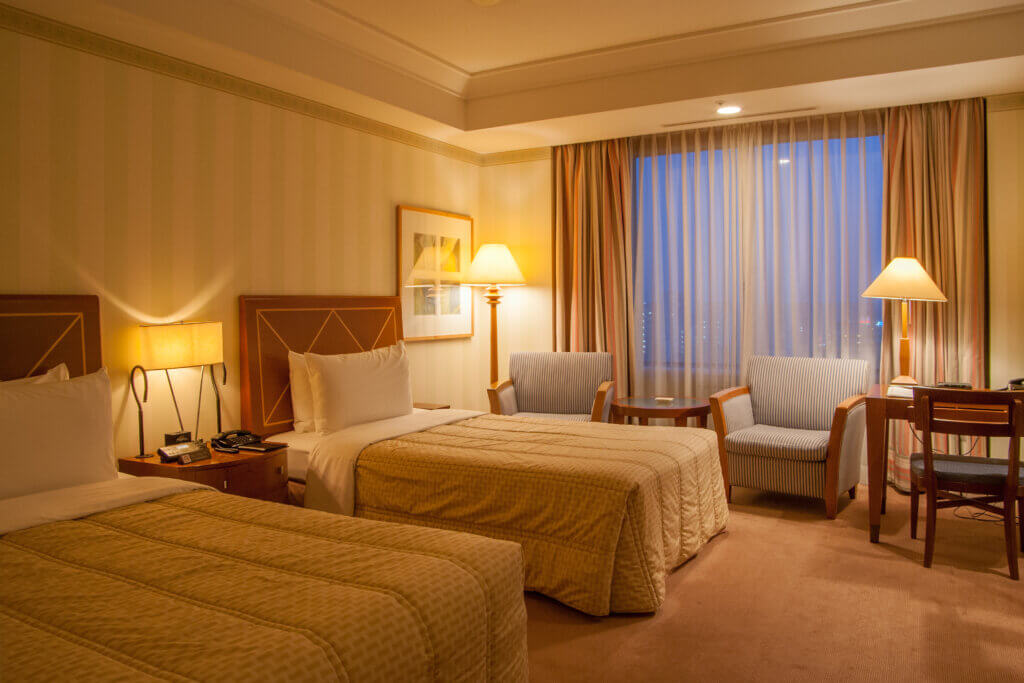
Accommodation rates at the Imperial Hotel vary based on the season, room type, and plan.
Imperial Hotel Tokyo
- Standard Rooms: Around ¥50,000 per night and up.
- Suites: Ranging from tens to hundreds of thousands of yen per night.
Imperial Hotel Osaka
- Standard Rooms: Around ¥30,000 per night and up.
- Suites: From tens of thousands of yen per night.
Kamikochi Imperial Hotel
- Standard Rooms: Around ¥30,000 per night and up.
- Suites: Around ¥60,000 per night and up.
These are approximate prices and may vary. For accurate rates, check the official website or booking platforms.
Additionally, the Imperial Hotel offers various plans, including anniversary and family travel packages, catering to diverse needs.
Detailed Guide to Imperial Hotel Cookies and Peanut Cream
The Imperial Hotel’s cookies and peanut cream are beloved products that have been cherished by many for years.
With their refined flavors and commitment to high-quality ingredients, these items make excellent treats for yourself or as thoughtful gifts.
Below, we provide a detailed look at their features and purchasing options.
Where to Buy Imperial Hotel Cookies: Types and Price Ranges
Imperial Hotel Cookies: Features
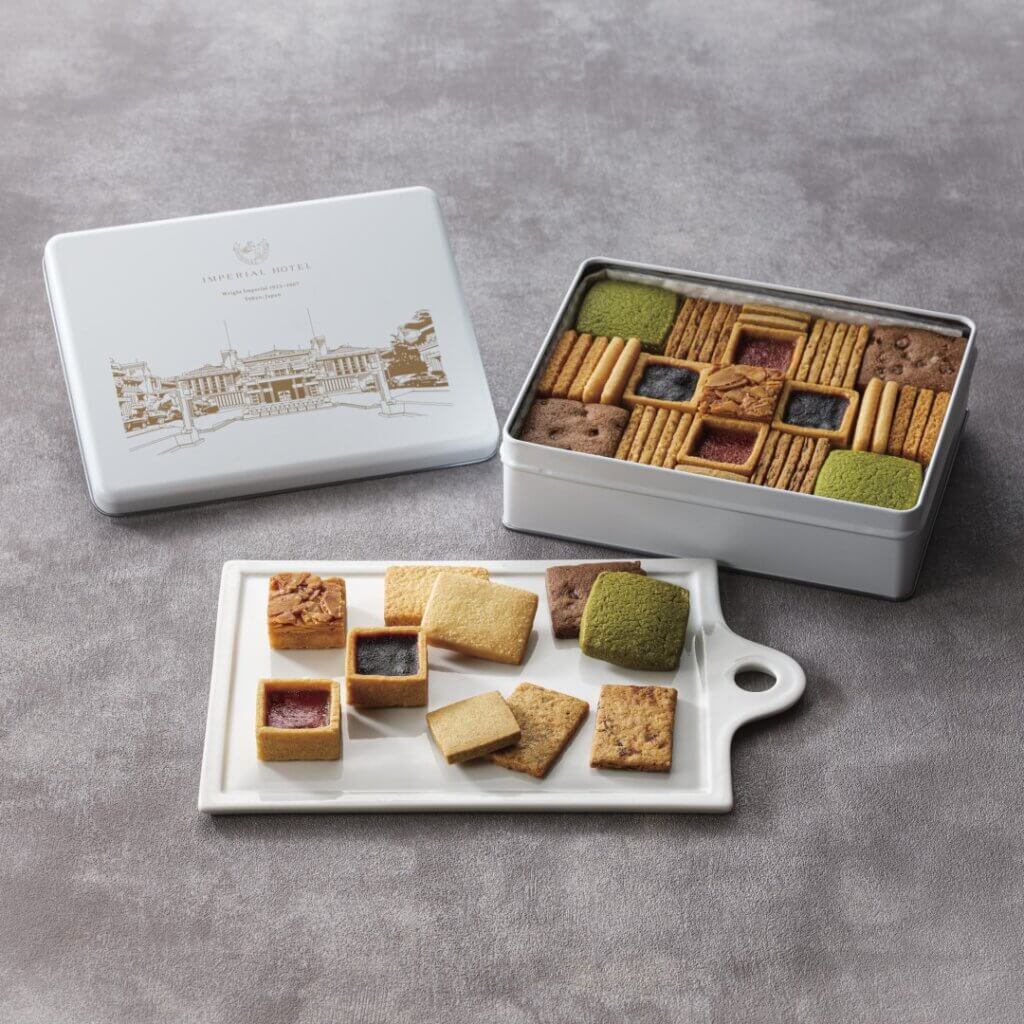
Imperial Hotel cookies are crafted with carefully selected ingredients and baked to perfection.
They are rich in buttery aroma, with the flavors of nuts and fruits standing out. These cookies are ideal for both personal enjoyment and as gifts.
Main Types and Price Ranges
- Cookie Assortment (C-26)
- Contents: A luxurious assortment of 36 cookies in 7 different varieties
- Price: ¥3,240 (tax included)
- Features: A diverse selection of flavors, perfect for gifts or souvenirs.
- Chef’s Snoopy Cookies
- Contents: Adorably designed cookies in collaboration with Snoopy
- Price: In the ¥2,000 range
- Features: An excellent choice for children or Snoopy fans.
- Other Cookies
- Flavors: Chocolate, fig, macaron, coconut, and more
- Price: Starting from approximately ¥100 per piece (individual packaging)
- Features: Simple packaging makes them ideal for everyday snacks or casual gifts.
Where to Buy
- Imperial Hotel Tokyo Shop “Gargantua”
Located on the 1st floor of the main building, open from 8:00 AM to 8:00 PM. Gift wrapping services are also available. - Major Transportation Hubs
Available at shops in Haneda Airport Terminals 1, 2, and 3, as well as JR Tokyo Station and JR Ueno Station. Perfect for travelers and business trips. - Official Online Shop
Orders can be placed 24/7 with nationwide delivery. Cold storage shipping ensures product quality, making it ideal for gift purchases. - Select Supermarkets and Department Stores
Available at stores such as Seijo Ishii and Takashimaya. However, stock and varieties may be limited, so checking with the store in advance is recommended.
Where to Buy Imperial Hotel Peanut Cream: Features and Purchasing Guide
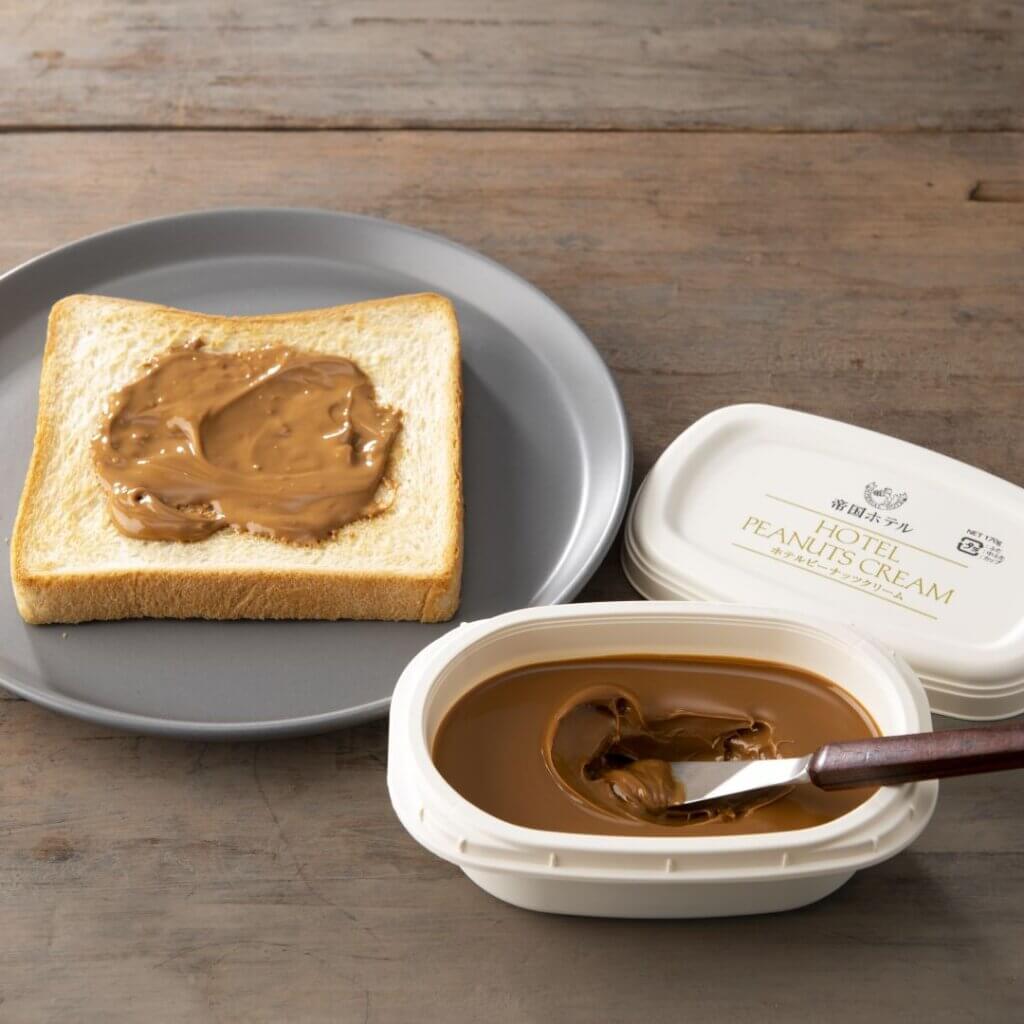
Imperial Hotel Peanut Cream: Features
The Imperial Hotel peanut cream is made by roasting and blending multiple types of peanuts to achieve a rich flavor and toasty aroma. It is mildly sweet, with a smooth and creamy texture.
Price
- Size: 170g
- Price: ¥496 (tax included)
Recommended Uses
- Spread on toast or baguettes.
- Use as a topping for ice cream or as an ingredient in baking.
- Pair with crackers or vegetable sticks for a savory snack.
Where to Buy
- Imperial Hotel Tokyo “Gargantua”
Available on the 1st floor of the main building, where it can be purchased directly. It’s also a popular gift item. - Official Online Shop
Nationwide delivery is available, with cold storage shipping to maintain quality. - Select Supermarkets and Department Stores
Available at stores like Seijo Ishii, Life, and Takashimaya. Due to limited stock, it is advisable to confirm availability with the store beforehand. - Online Retailers
Available on platforms like Amazon, Rakuten, and Yahoo! Shopping. Prices and shipping fees may vary, so comparing options is recommended.
Summary
The Imperial Hotel’s cookies and peanut cream are high-quality products known for their rich flavors and premium ingredients.
They make excellent gifts or indulgent treats.
Purchase them from the Imperial Hotel’s official stores, online shop, select supermarkets, or major online retailers, and enjoy a luxurious taste of these timeless favorites.
Summary of the Imperial Hotel (Tokyo)
- The Imperial Hotel is a prestigious luxury hotel with over 130 years of history.
- Located in Tokyo’s Hibiya district, it is within a 5-minute walk from JR Yurakucho Station, Tokyo Metro Hibiya Station, and Ginza Station.
- The hotel consists of two buildings: the Main Building and the Tower Building.
- There are a total of 1,133 guest rooms.
- It offers a variety of dining options, including Japanese, Western, and Chinese cuisines.
- Famous restaurants include the French fine-dining Les Saisons and the buffet-style Imperial Viking Sal.
- Accommodation rates vary based on the season, room type, and plan, with standard rooms starting around ¥30,000 per night.
- A wide range of accommodation packages is available to meet different needs.
- Hotel-made cookies are a popular choice for souvenirs and gifts.
- Cookies can be purchased at the hotel shop, online store, and select department stores.
- The rich peanut butter and smooth peanut cream are also highly regarded.
- Lunch options include buffet-style restaurants and authentic French cuisine.
- The Imperial Hotel is a symbol of tradition and sophistication, representing Japan as one of its most iconic hotels.
